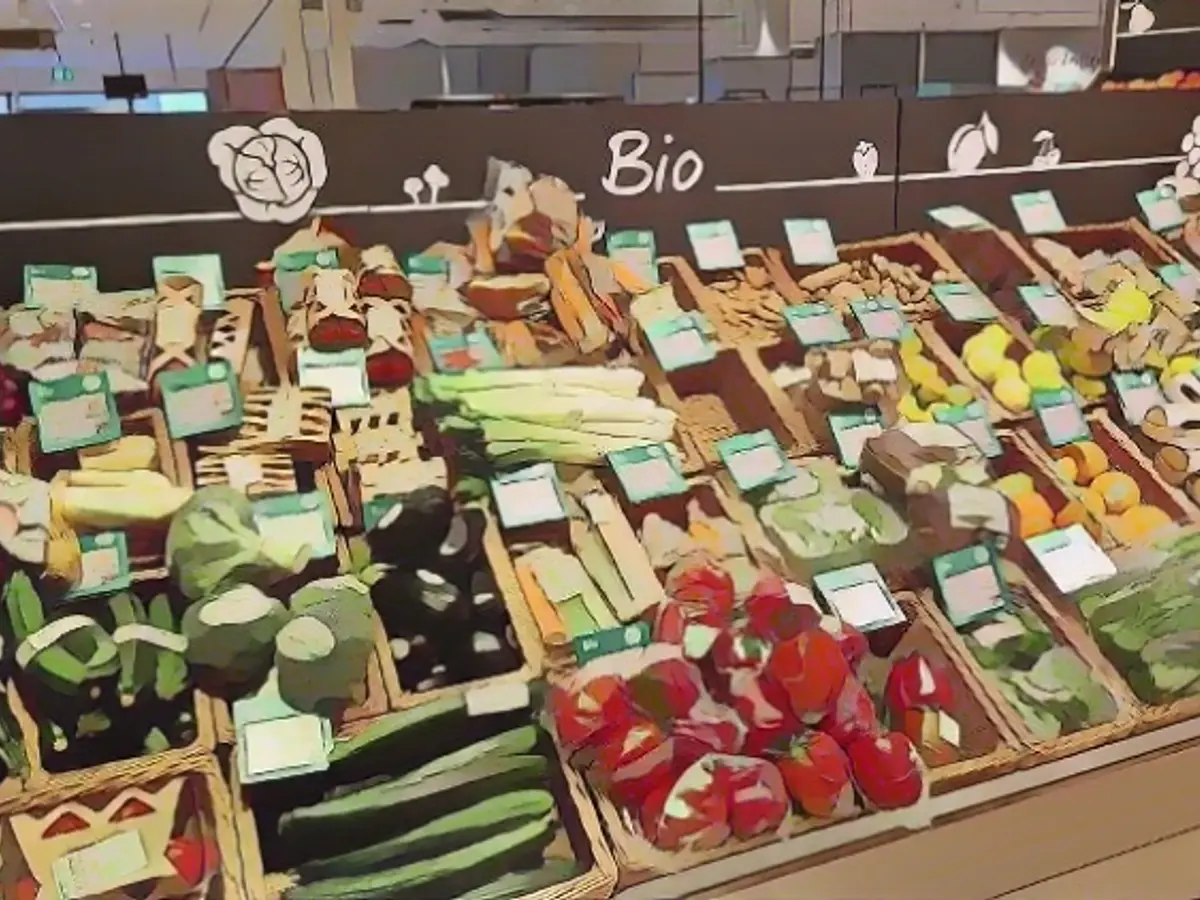The organic market is recovering from the price shock
When it comes to tomatoes, apples or eggs, many consumers like to choose organic - but in times of rising prices, the market for sustainably produced products also entered a weak phase. Now there are signs of a recovery.
The organic food business suffered during the period of high inflation - but according to industry figures, things are now on the up again. "Organic sales are consolidating in 2023", according to a market report by the German Farmers' Association. According to data from market research company GfK, sales of fresh produce had grown by 2.8% by October. The range of packaged goods is also likely to have been in positive territory.
"German organic food sales would therefore grow towards 16 billion euros in 2023." The large retail chains and prices play a more important role in this. The temporarily weakening organic business could therefore pick up again fairly quickly. "Growing sales can be expected for 2024," says the market report at the turn of the year. This is because all major food retail chains are making a name for themselves with organic product ranges. In 2022, the organic market in Germany, which is accustomed to success, recorded a decline. According to the German Federation of the Organic Food Industry, sales fell by 3.5 percent to 15.3 billion euros.
"Organic sales winners" are the discounters
Politicians are also focusing on a faster expansion of organic farming - and this depends on a further increase in demand. The coalition's declared aim is to increase the proportion of organic farming to 30 percent of the total agricultural area by 2030. Recently, it has risen further - but only slightly to 11.2 percent at the end of 2022. 14.2 percent of all farms are now organic.
The focus is also on how robust organic is proving to be as a business model. In the first year of the coronavirus pandemic in 2020, when many people cooked at home, turnover skyrocketed by 22% to 15 billion euros and continued to grow to 15.9 billion euros in 2021. Then came an unusual setback in 2022. Despite the return of many people to restaurants and canteens, where there is usually no organic offer, organic food was still able to "largely" maintain sales, explained the German Federation of Organic Food Producers.
However, organic products, which usually cost a little more, were also affected by a reluctance to buy more expensive foods during the high inflation - with a strong trend towards buying in supermarkets, while specialist stores were left behind. "Organic sales winners" were once again the discounters, according to the farmers' association's report.
"Nobody has to switch to organic"
However, the Bundesverband Naturkost Naturwaren recently reported that the initial drop in demand had increased in the second half of 2023. Since June, sales figures have been consistently higher than in the same month last year. Agriculture Minister Cem Özdemir (Greens) has presented his department's strategy to boost organic sales. The focus is on increased organic research in order to increase organic farming yields. Consumers are also to be better informed about the environmental and animal welfare benefits of organic products.
One lever should be more organic food in canteens and restaurants. So that people can see at a glance how "organic" a kitchen is, providers can voluntarily use a round logo in the medal colors to advertise themselves. It shows the proportion of organic food in relation to the monetary value of the total purchase of goods. For gold it must be 90 to 100 percent organic, for silver 50 to 89 percent and for bronze 20 to 49 percent. According to the Ministry, the logos can be applied if companies are certified - the Ministry's own canteen in Bonn and that of the Ministry of Labor in Berlin already have a bronze logo.
For more organic food, it is also important that more farms join in. Özdemir already emphasized when presenting his strategy in mid-November: "Nobody has to switch to organic." It is an option. However, the mood in the entire sector has been at a low point since the coalition government announced plans to cut two benefits in order to save money: the regulations on agricultural diesel and the vehicle tax exemption for agricultural vehicles. Özdemir distanced himself from these plans. However, the farmers' association warns in the market report that this could further worsen the subdued economic outlook. Sharp protests also came from organic producers.
Read also:
- Why there is still no EU funding for green Saar steel
- 3 billion Saar Fund is unconstitutional
- Lack of snow also opens up new opportunities for winter tourism
- Abrupt end to e-car subsidies
Despite the inflation-induced increase in food prices, organic food sales are projected to recover, with a potential increase to 16 billion euros in 2023. This resurgence is partly due to the expansion of organic product ranges by major food retail chains. However, during periods of high inflation, organic products, which are generally more expensive, faced a resistance in sales, with a trend towards buying in supermarkets over specialist stores.
Source: www.ntv.de








